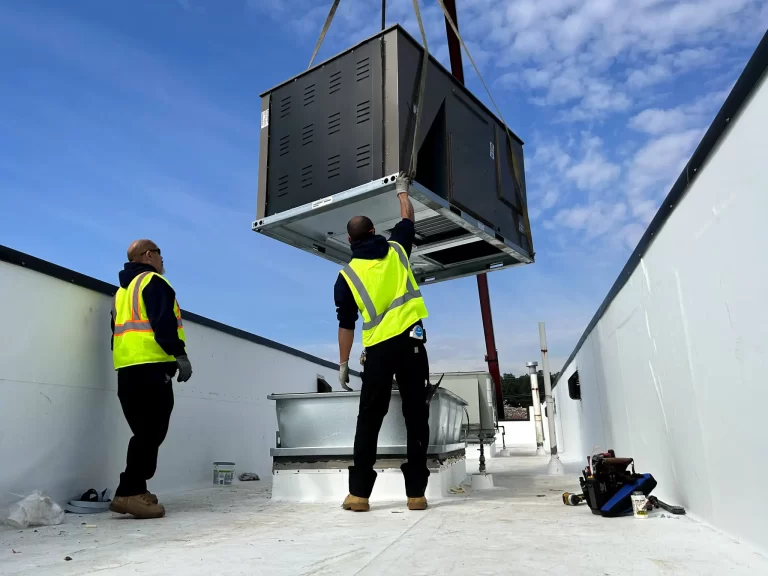Looking to replace your HVAC system in Centreville? You’ve come to the right place. At our Centreville HVAC Replacement Services, we understand the importance of having a fully functional heating, ventilation, and air conditioning system in your home or office. In this article, we will discuss the need for HVAC replacement, evaluate replacement options, outline the replacement process, and provide maintenance tips for your new HVAC system.
Understanding the Need for HVAC Replacement
Knowing when to replace your HVAC system is crucial for maintaining a comfortable indoor environment. Here are some signs that indicate it may be time for HVAC replacement:
Signs Your HVAC System Needs Replacement
1. Excessive energy bills: If your energy bills have been steadily increasing despite regular maintenance, it could be a sign that your HVAC system is no longer efficient.
When an HVAC system becomes old and worn out, it starts to lose its efficiency. This means that it needs to work harder and consume more energy to provide the same level of heating or cooling. As a result, your energy bills may skyrocket, causing unnecessary financial strain.
2. Inconsistent temperatures: Uneven heating or cooling throughout your home or office is a clear indication that your HVAC system is struggling to provide adequate comfort.
Imagine walking into different rooms in your home, only to find that some are freezing cold while others are uncomfortably warm. Inconsistent temperatures not only make it difficult to find a comfortable balance but also indicate that your HVAC system is no longer able to distribute air evenly. This could be due to worn-out components or an inefficient ductwork system.
3. Frequent repairs: If you find yourself constantly calling for HVAC repairs, it may be more cost-effective to invest in a new system that is reliable and efficient.
While occasional repairs are normal for any HVAC system, frequent breakdowns and repairs can quickly become a hassle and drain your wallet. Constantly fixing an old HVAC system is like putting a band-aid on a deep wound – it may temporarily solve the problem, but it won’t address the underlying issues. Investing in a new, reliable system will not only save you money in the long run but also provide peace of mind.
The Importance of Timely HVAC Replacement
Delaying HVAC replacement can have serious consequences. An outdated system not only compromises comfort but also poses health and safety risks. Old HVAC systems are more prone to breakdowns and can release harmful pollutants into the air, putting your health at risk.
When an HVAC system reaches the end of its lifespan, it becomes less reliable and more prone to malfunctions. Imagine your HVAC system breaking down in the middle of a scorching summer or freezing winter. Not only would you be left without proper heating or cooling, but it could also lead to discomfort, stress, and potential health issues.
Furthermore, old HVAC systems can release harmful pollutants into the air, such as carbon monoxide or mold spores. These pollutants can have severe health implications, especially for individuals with respiratory conditions or weakened immune systems. Timely replacement of your HVAC system ensures that you and your loved ones breathe in clean, healthy air.
Evaluating Your HVAC Replacement Options
When considering HVAC replacement, it’s crucial to evaluate your options to ensure you choose the right system for your needs. Here are some factors to consider:
Replacing your HVAC system is a significant decision that can greatly impact your comfort and energy efficiency. With the wide range of options available in the market, it’s important to take the time to research and evaluate the different systems to find the perfect fit for your home.
Types of HVAC Systems for Replacement
There are several types of HVAC systems to choose from, including:
- Central air conditioning systems
Central air conditioning systems are a popular choice for homeowners looking to cool their entire home efficiently. These systems use ductwork to distribute cool air throughout the house, ensuring consistent comfort in every room.
- Ductless mini-split systems
Ductless mini-split systems offer a flexible and energy-efficient solution for cooling individual rooms or specific areas of your home. With their compact design and easy installation, these systems are a great option for homes without existing ductwork.
- Heat pump systems
Heat pump systems provide both heating and cooling capabilities, making them a versatile choice for year-round comfort. These systems work by transferring heat between the indoors and outdoors, providing efficient heating in winter and cooling in summer.
Factors to Consider When Choosing a New HVAC System
1. Size: Proper sizing is essential to ensure optimal performance and energy efficiency. Our HVAC experts can help determine the appropriate size based on your home’s square footage and insulation.
Having an HVAC system that is properly sized for your home is crucial. An undersized system will struggle to meet your comfort needs, while an oversized system will cycle on and off frequently, wasting energy and causing unnecessary wear and tear on the equipment. By accurately calculating the heating and cooling load of your home, our experts can recommend the right size system that will provide efficient and consistent comfort.
2. Energy efficiency: Look for Energy Star certified models that will help reduce your energy consumption and lower your utility bills.
Energy efficiency is a key consideration when choosing a new HVAC system. Energy Star certified models meet strict standards for efficiency, ensuring that they use less energy to operate without compromising on performance. By investing in an energy-efficient system, you can not only save money on your utility bills but also contribute to a greener and more sustainable environment.
3. Budget: Consider your budget and long-term savings when selecting a new HVAC system. Remember, investing in energy-efficient models may result in significant savings over time.
While budget is an important factor to consider, it’s essential to look beyond the initial cost and consider the long-term savings. Energy-efficient HVAC systems may have a higher upfront cost, but they can provide substantial savings over their lifespan through reduced energy consumption. By carefully weighing the initial investment against the potential savings, you can make a financially sound decision that will benefit you in the long run.
The HVAC Replacement Process
Replacing your HVAC system involves several steps. Here’s what you can expect:
Initial Consultation and Inspection
Our HVAC technicians will assess your current system, discuss your requirements, and provide recommendations for replacement. We will take into account factors such as your budget, energy efficiency goals, and desired features.
Installation and Testing of New HVAC System
Once you’ve chosen your new HVAC system, our team will install it professionally and test its functionality to ensure that it’s functioning optimally. We will also provide instructions on how to use and maintain your new system.
Cost and Financing of HVAC Replacement
Understanding the cost of HVAC replacement and available financing options is essential for planning your replacement project. Here’s what you need to know:
Estimating the Cost of HVAC Replacement
The cost of HVAC replacement can vary based on factors such as the type of system, size, additional features, and any necessary modifications. Our team will provide you with a detailed estimate based on your specific requirements.
Financing Options for Your HVAC Replacement
Don’t let the upfront cost deter you from getting the HVAC system you need. We offer flexible financing options to make HVAC replacement more manageable. Speak to our team to explore financing plans that fit your budget.
Maintenance Tips for Your New HVAC System
Proper maintenance is key to extending the lifespan and performance of your new HVAC system. Here are some essential maintenance tips:
Regular Cleaning and Inspection
Schedule regular cleaning and inspection with our HVAC professionals to remove any debris, dust, or pollutants that could hinder the performance of your system.
Seasonal Maintenance for Optimal Performance
At the beginning of every season, perform routine maintenance tasks such as changing filters, checking thermostat settings, and inspecting ductwork. This will help ensure optimal performance throughout the year.
With Centreville HVAC Replacement Services, you can trust that your HVAC replacement needs are in capable hands. Our experienced team is committed to providing the highest quality service and ensuring your complete satisfaction. Contact us today to schedule a consultation and take the first step towards a more comfortable and energy-efficient home or office.


